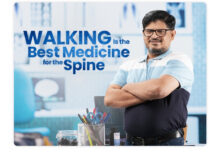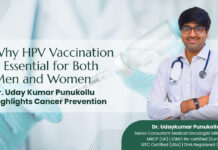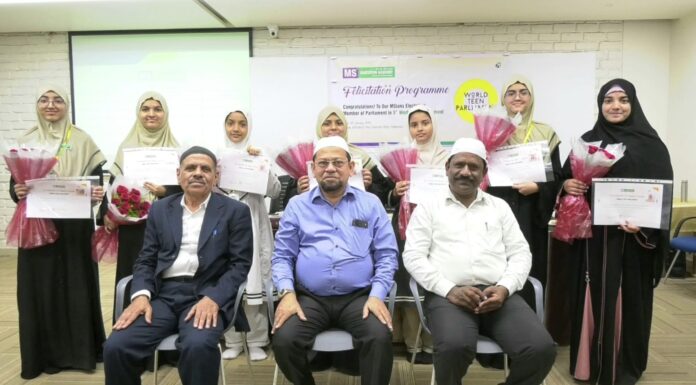
Apollo Hospitals hosts the Conference in collaboration with NBEMS, Govt. of India
Hyderabad, November 22, 2021: Chief Guest Dr. (Smt.) Tamilisai Soundararajan, Hon’ble Governor of Telangana & Hon’ble Lt. Governor of Puducherry; delivered the valedictory address at the COMMUNICATION – 2021, conference on Communication in Healthcare; being hosted by Apollo Hospitals, Hyderabad; in collaboration with the National Board of Examinations in Medical Sciences (NBEMS), Ministry of Health & Family Welfare, Govt. of India and in association with the Society for Development & Implementation of Professional Curriculum for Communication in Healthcare (SDIPCCH); at Apollo Hospitals, Jubilee Hills, today. Also present were Guest of Honour Dr Abhijat Sheth; President, NBEMS, Ministry of Health & Family Welfare, Govt. of India;Dr K Hari Prasad, President, Apollo Hospitals Group; and Mr Rajiv I. Modi, Chairman & Managing Director, Cadila Pharmaceuticals Ltd., among others.
Dr. (Smt.) Tamilisai Soundararajan, delivering her valedictory address appreciated Apollo Hospitals for taking the initiative for conducting this program on communication in association with National Board of Examinations. It is the need of the hour and I appreciate the NBE, particularly under the dynamic leadership of Dr Abhijat ShethNBE brought out several reforms in the last five years to partner with various hospitals to conduct more such workshops under the SDIPCCH. As a doctor I am aware how communication is critical and as WHO mentions that 8% to 38% of medical professionals at any point of their profession face physical and verbal violence, specifically because of poor communication. I can narrate an incident, when I was a medical student at Thanjavur Medical College, a patient was admitted with symptoms of myocardial infarction and the whole team of medical specialists, particularly the intensivists, did their best and he was out of danger and next day when the cardiologist went for rounds, the patient in an irritated mood expressed his distress of suffering from such a major problem and the doctors not being able to solve it. The Cardiologist tried to reason out saying you came with a major problem, and we solved it, but the patient went about saying I haven’t passed my stools since morning. The reason being the patient wasn’t communicated the criticality of his problem and he continued to presume constipation was the problem he faced and that wasn’t addressed. My husband a Nephrologist referred a patient to me for a second opinion, the scan center he went for scanning informed him of his condition to be normal but wanted a second opinion because he had typical symptoms. I found a renal tuberculosis, which was little difficult to detect in Ultrasound, but my exposure helped me to detect it and gave a report. But the patient wasn’t convinced because he said, the Doctor at Scan center scanned for an hour, while you kept the probe for 5 minutes and gave an opinion, therefore the opinion is wrong. Despite the diagnosis being right the patient didn’t believe because the diagnosis was done in a short time and he perceived that the diagnosis lacked seriousness, so the communication of displaying seriousness was missing for him. In another instance a patient was advised to come with ‘Full Urine’ and when the patient was called in and enquired if had come with full urine, he opened a bag and started placing 3 Horlicks bottles full of yellow liquid, on enquiring he said since you asked to come with full urine, I collected all the urine and brought them to you. Even though this is a non-incident but highlights the significance of communicating the way he would understand. During our rounds, a Doctor got a call enquiring about a patient in one of the beds, about his condition, problem, treatment etc., he was informed all the details and that’s when the Doctor asked who was he, the person on the call said he is the patient in that bed and when he sought information from Doctors around, they were not responding and therefore had to enquire through this phone call. These are the situations we face because of practically loss of communication. As is said communication is 20% of the knowledge which has to be conveyed with 80%of information to convince the patient, if it is communicated the way he understands he would be convinced. Effective communication need not always be long and need not be verbal, non-verbal also makes a difference, so while treating the patient our body language also plays a role, therefore we should be conscious of it. If you convey over information also it can lead to issues, patients go back and do Google search and pose doubts, so what we convey should be appropriate and limited to it. Also, we should be sure whom we are communicating the information about the patient, either it should be to his immediate family member or if multiple people are seeking information ask them to come as a group and then convey to them at one go. Communication in today’s world is critical especially in the healthcare sector. We as Doctors are on a knowledge acquiring spree of the latest and the most complicated aspects. We shouldn’t limit ourselves to learn about complex issues, it is also important to acquire knowledge about the simplest aspects to accomplish success and communication is one of them, especially in our profession. Here Apollo Hospitals and NBE have to be commended for organizing a Workshop on a subject like this, because we attend CMEs to update our skills in the advances happening while ignoring a simple thing like communication which is also equally important or else leads to complications.She conclude by saying, communication can connect you, communication can correct you, communication may construct you, communication may caution you, communication make you courageous and communication makes you complete.
Dr Abhijat Sheth, President, National Board of Examinations in Medical Sciences, in his keynote address said, Communication in Health care plays a critical role, especially in the relation between a physician and his/ her patient. NBE is planning to impart training on communication as part of the DNB curriculum and conduct workshops on communication at regular intervals to train PG doctors. He pointed out that, it is important for a PG trainee to know how to break a bad news and how to counsel a patient and their family in such conditions. He expressed immense delight at Apollo Hospitals taking the initiative to partner in this mission.
COMMUNICON 2021, empowers the delegates to communicate effectively with different stakeholders involved in healthcare delivery. It has tremendous significance especially from patients’ perspective, to help bridge the communication void often seen leading to distrust and ugly face-offs between patients and medical community. The various topics deliberated at the Conference included Effective Communication, Role of non-verbal communication in physician-Patientinteraction, Empathy in communication, Breaking bad news, Violence against doctors, Breaking bad news in Obstetrics practice, Digital communication – the good, the bad, and the ugly and Communication during the Pandemic among others. The eminent faculty comprised of Dr Sitangshu Basu, Principal Consultant, Dept. of Laparoscopic, Minimal Access Surgery, General Surgery, Max Super Specialty, Delhi; Dr GG Laxman Prabhu, Professor & HOD, Dept. of Urology, Kasturba Medical College, Mangalore; Dr Veena Upadhyay, Chairman, Governing Body Jan Shiksha Sansthan, Skill Development Programme; Dr Ajay Kumar, Director Urology, Nephrology & Transplant, Paras HMRI Hospital, Patna; Dr Shiva Kant Misra, Vice-President, National Board of Examinations in Medical Sciences, Ministry of Health & Family Welfare; Dr Neelam Mishra, Director & Chief Consultant, Dept. of OBG & Laparoscopic Surgeon, Shivani Hospital, Kanpur; Dr Shishta N. Basu, President, Society for Communication in Health Care and Dr. Rajesh Upadhyay, Senior Director & HOD, Gastroenterology & Hepatology, Max Super Specialty, Shalimar Bagh, Delhi.




















